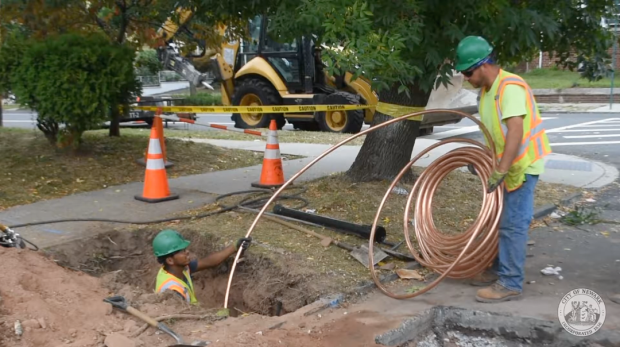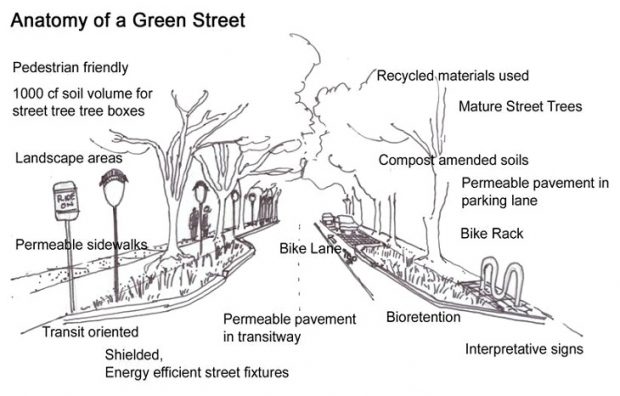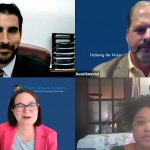New Jersey Future Blog
Sustainable and Cost-Efficient: Implementing a Dig-Once Policy in Trenton
August 30th, 2024 by Samirah Hussain

Lead service line replacement in Newark, New Jersey. Photo by the City of Newark.
Funding, funding, funding–the chorus frequently heard at the inception of almost every community improvement project. Financing remains one of the largest obstacles to infrastructure improvements. The increased frequency and severity of climate disasters and subsequent repair efforts have only exacerbated the issue. The solutions, however, lie in new and innovative approaches to infrastructure development—one such strategy being the dig-once policy.
A dig-once policy is a strategy to coordinate major community infrastructure projects to reduce negative environmental effects, construction disruptions, and costs. Some policies may focus on installing new, modernized infrastructure, such as telecommunications, during the excavation phase of major roadway or water projects. Others may focus on coordinating priorities of state agencies, such as the New Jersey Department of Transportation (NJDOT) and the New Jersey Department of Environmental Protection (NJDEP), to align investments into major infrastructure improvement projects for mutual benefit. In the case of Trenton, New Jersey, the dig-once policy could serve as an example of a sustainable and cost-efficient method to install green infrastructure alongside the city’s lead service line replacement program.
Trenton: A Case Study
Background
In 2022, the City of Trenton passed an ordinance to establish a Complete and Green Streets policy, which aims to create accessible and safe roads for bicyclists, public transit users, pedestrians, and drivers while incorporating green infrastructure to manage stormwater runoff, reduce air pollution, and more. Since then, the city implemented a wide variety of community engagement, construction, and research projects largely funded by state and federal grants to accomplish the goals in their adopted policy. At the same time, Trenton Water Works, a publicly owned drinking water system, is undertaking a lead service line replacement program in compliance with state legislation mandating the removal of all lead service lines statewide by 2031.

Courtesy of the Environmental Protection Agency (EPA)
In both areas, Trenton has excelled. New Jersey Future’s Managing Green Infrastructure program conducted research to log Complete and Green Streets resolutions or ordinances passed in the Delaware River Basin, as well as Complete and Green Streets projects municipalities took on as a result. Based on this research, the city is one of the leading municipalities in the Delaware River Basin for Complete and Green Streets green infrastructure projects. Since 2017, Trenton Water Works reported that it has already replaced almost 30% of its lead service lines and is currently developing a plan to replace its remaining service lines by 2031.
Despite this success, more work can be done. Trenton Water Works reports it has replaced approximately 10,000 lead service lines already, and estimates there may be up to 20,000 still remaining. Complete streets, tree-lined roads, and rain gardens have been constructed in certain areas throughout Trenton. “Our Streets: A Bike Plan for All” is a community engagement and urban planning project carried out by the Delaware Valley Regional Planning Commission and City of Trenton, has the goal of establishing complete streets all across Trenton. As of August 2024, the project is still developing its final report, highlighting that the work is nowhere near finished.
Implementing The Policy
Trenton is uniquely positioned to build on its success by implementing a dig-once policy while completing lead service line replacement and installing complete and green streets. Lead service line replacement requires digging up roads, lawns, and green spaces at multiple points in the removal process. Complete and Green Streets projects require repainting roads, installing safety equipment, planting trees and rain gardens, and extending roads. Implementing a dig-once policy would mean contractors for both projects align construction and contractors work collaboratively in the same locations. For example, as contractors dig up asphalt for lead service line replacement, infrastructure for green streets can be installed in the same areas. When the road is repaired and repaved, a complete streets design can be implemented. Having to “dig once” for two different projects saves on construction costs, limits construction disruptions and road closures, and reduces excessive environmental disruptions.
As the state’s capital, Trenton has both the visibility to garner public support for such projects and the duty to act as a role model for other municipalities. With climate-related disasters reaching an all-time high, investing in climate-resilient infrastructure is more pressing than ever.
The difficulty lies in achieving such a high level of coordination between organizations doing unrelated work but aiming for similar improvements to water quality and public safety: Trenton Water Works, the New Jersey Department of Transportation, and the City of Trenton. Technical assistance providers, like New Jersey Future, take the initiative to facilitate the required connections. Moreover, both lead service line replacement and Complete and Green Streets projects require oversight and involvement from overlapping intermediary organizations, like the NJDEP and the NJDOT. These state agencies can utilize their oversight to facilitate coordination between lead service line replacement and Complete and Green Streets projects. With state agencies and municipalities operating on limited budgets, fully funded by taxpayer dollars, coordinated planning on overlapping infrastructure initiatives is in the public’s best interest to save costs.
Closing
Collaboration has the power to make the dig-once policy a reality, saving time, money, and the environment all at once. In the vast majority of townships, the need for infrastructure improvements often exceeds the amount of funding available. Many projects, as is the case in Trenton, are funded with state and federal grants that are limited in quantity and require a township to dedicate additional resources just to apply. A lack of funding, however, does not cause community needs to disappear. Complete and Green Streets are necessary to create healthier, safer, and more comfortable communities resilient to worsening climate disasters. Lead service line replacement is vital to address the life-threatening effects of lead in our community’s drinking water. The dig-once policy offers a strategy to address Trenton’s community needs while saving money and resources. We must rely on innovative solutions to pave a path toward progress—and our state’s capital has the opportunity to lead the way.
Related Posts
Tags: complete and green streets, Complete Streets, funding, funding green streets, green infrastructure, pedestrian accessibility, Transit
















